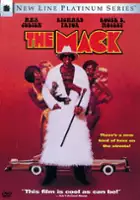The Mack
1973
powrót do forum filmu The Mack
jeśli twoje dziecko najbardziej na świecie kocha filmy, a ty najbardziej na świecie kochasz swoje dziecko, to kup mu cinema speculation - w świątyni, rozdział 01:
even including its flaws, The Mack is the best and most memorable crime picture of the whole blaxploitation genre.
ps.
And besides, there already was a “Black” Mean Streets (like there was a “Black” Shampoo) done in the very same year.
Michael Campus’ The Mack.
And while Campus’ film didn’t receive a rave review from Pauline Kael in The New Yorker or make Vincent Canby’s top ten list of the year in The New York Times (however Ralph Bakshi’s Heavy Traffic did), it performed far better at the box office than did Mean Streets and for the audience it was made for, proved every bit as iconic if not more so.
But even including its flaws, The Mack is the best and most memorable crime picture of the whole blaxploitation genre. Like Mean Streets did with its posse of Little Italy hustlers, The Mack takes the viewer on a tour of a closed-to-the public subculture.
The picture contains dialogue so memorable (“You’ll have so much money, it’ll look like your pockets got a case of the mumps.” “Shut the fakk up when grown folks are talkin’.”), that four different generations of black men have been quoting it for the last forty years. Visceral lurid violence (“Stick yourself!”) that has the snap of a Holloway House trash paperback (Where’s the Donald Goines novelization?). Its predatory pimp psychology is presented as Jungian philosophy (“Anybody can control a bitch’s body, but a mack can control a bitche’s mind.”). And like Ron O’Neal’s pusher hero Priest in Superfly both his lawlessness and his opportunism, usually at the expense of his own community, is presented as a nonconformity.
Despite the fact the film’s story is taken whole from Scarface and a dozen other rise-and-fall gangster sagas, both the milieu and subject matter contain such a new-to-the-movies vitality (especially in 1973) that the familiarity with the structure helps more than it hurts. You don’t have to guess what’s going on or why Goldie does what he does. You may have never been in this world before, but you’ve seen this story before. Almost every character is an afro-centric variation on a white archetype from thirties gangster stories.

